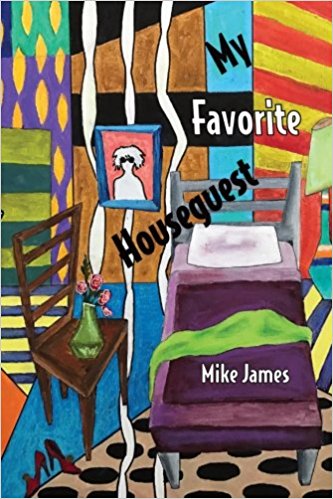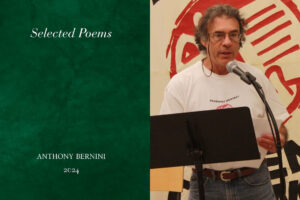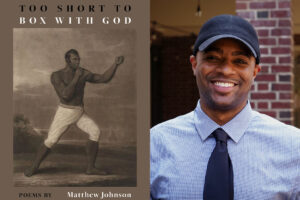 My Favorite Houseguest by Mike James
My Favorite Houseguest by Mike James
FutureCycle Press, 2017
62 pages
$15.95 on Amazon
In his new poetry collection, Mike James invites us into his ruminations about American icons and lesser knowns, who have taken up residence in his mind. Whether he is “playing ping pong on a table beside a large cactus” with Marilyn Monroe or writing from Basquait’s perspective about “why kids make the best artists,” his poems are provocative snapshots that often organically incorporate quotes and facts.
In “Nixon,” James pragmatically depicts the former president as any man when he says, “some fathers are just bad. Drink too much. Gamble with money set aside for school shoes.” This proposed idea allows the reader to consider Nixon in a more relatable light. In another poem “Bad Presidents,” recognizable in the current political climate, James makes a connection between power and paranoia when he says, “One or more might have been great. Instead they were overcome by conspiracies seen in every cupboard, by a lack of love they could never replace. So they slumped from room to room and peeked through curtains and spoke in whispers and saw stars only through windows.” Like anyone else, those with power, have their own issues, fears, and shortcomings.
One of the most intriguing aspects of this collect is the organization of the poems, you would expect “Nixon” to be next to “Bad Presidents,” but instead the piece is sandwiched in between a poem about John Wayne where James says, “He believed in midnight, bourbon, and tomorrow” and “Self Portrait, In a Dream” where the narrator is in his house with “a bb gun. The North Koreans have attacked once again,” how perfect considering how Nixon had considered nuclear options in 1969 against North Korea and later abandoned his punitive strike plan. And how perfect the ending of the poem: “Even though it’s daylight and power is on in the house, it is very dark. Fear keeps everything in place. None of the shadows are mobile.” Those last two lines not only enkindle an enduring image, they also seem to add insight touched upon in other pieces.
The placement of “Candy Darling” is another example of brilliant sequencing. In the piece, James writes, “Sometimes the best-looking women are men,” and “there are a thousand different people within each poem.” In the poem just before this one, “Dream with Sinclair Lewis,” the narrator is having an exchange with the author. Lewis asks, “And why couldn’t you at least be a pretty blonde,” and the narrator responds, “ I know I say. “I’ve asked my father the same questions.”” While this clever sparring of wits sheds light on Sinclair’s own writing, the exchange also seems to introduce the idea that we can’t always be who others want us to be, a perfect segway into “Candy Darling”. Then in the poem that follows, “My Closet,” he writes, “ Thankfully, there’s my closet to disappear in. I love to slide aside the hangers of flannel shirts and corduroy jackets and step in among them.” You would expect a poem about Candy Darling, an American transgender actress, to be next to one about Lou Reed or Andy Warhol, but James does not do that and this is what makes this collection thought provoking, that and how James seems to be experimenting with voice and style, proving a versatile writer, one I look forward to reading more of.




